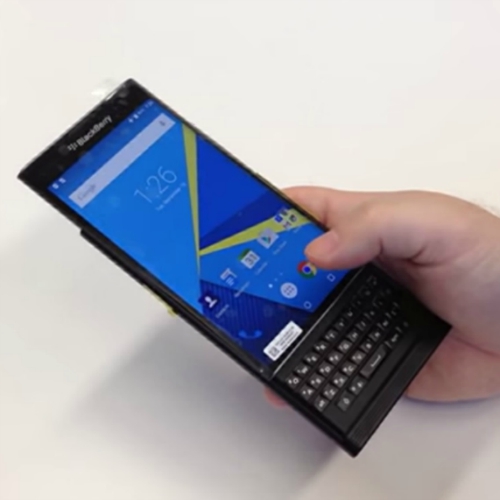BlackBerry announced plans today to sell an Android-powered
smartphone, in the latest reboot effort from the faded star of the
sector. The Canadian firm said its would begin selling "Priv," described
as "a flagship handheld device that will run on the Android operating system with BlackBerry security," expected to be available later this year.
"Priv combines the best of BlackBerry security and productivity with the expansive mobile application ecosystem available on the Android platform," said John Chen, executive chairman and chief executive. BlackBerry said however it "remains committed to the BlackBerry 10 operating system, which enables industry-leading security and productivity benefits." The company said it "will continue to develop and enhance the BlackBerry 10 operating system and is confirming plans to release platform updates focused on security and privacy enhancements," in March 2016.
The Priv, earlier known as the BlackBerry Venice,
is rumoured to pack a 5.4-inch qHD display, a 64-bit Qualcomm
Snapdragon 808 with 3GB RAM, an 18MP rear camera (with the dual-tone LED
flash in the video), and a 5MP front cam.
The BB 10 operating system was unveiled in 2013 as part of an effort to regain market share lost as consumers around the world shifted to devices running on Google Android and Apple's iOS. But the operating system share has fallen further, and now represents less than one percent of smartphone users.
BlackBerry, one of the early pioneers of smartphones, has been struggling for years. It has made several efforts to find new customer niches, with low-cost devices, tablets and by shifting its emphasis to software and services. In releasing its quarterly results, BlackBerry said it swung to a profit of US $51 million for the three months running up to August 29, compared with a loss of US $207 million in the same period a year ago.
But the profit came from a one-time credit from an adjustment in the value of some of its debts.
Revenues for the period slumped 46 percent from a year ago to USD 490 million. "I am confident in our strategy and continued progress, highlighted by our fourth consecutive quarter of year-over-year double digit growth in software licensing revenue and sixth consecutive quarter of positive free cash flow," Chen said. "At the same time, we are focused on making faster progress to achieve profitability in our handset business." BlackBerry said it sold 800,000 smartphones at an average price of US $240. That represents a tiny fraction of a global smartphone market of some 300 million per quarter. The company said 15 percent of its revenue came from software and services, 41 percent for hardware, and 43 percent for service access fees.
source
"Priv combines the best of BlackBerry security and productivity with the expansive mobile application ecosystem available on the Android platform," said John Chen, executive chairman and chief executive. BlackBerry said however it "remains committed to the BlackBerry 10 operating system, which enables industry-leading security and productivity benefits." The company said it "will continue to develop and enhance the BlackBerry 10 operating system and is confirming plans to release platform updates focused on security and privacy enhancements," in March 2016.
The BB 10 operating system was unveiled in 2013 as part of an effort to regain market share lost as consumers around the world shifted to devices running on Google Android and Apple's iOS. But the operating system share has fallen further, and now represents less than one percent of smartphone users.
BlackBerry, one of the early pioneers of smartphones, has been struggling for years. It has made several efforts to find new customer niches, with low-cost devices, tablets and by shifting its emphasis to software and services. In releasing its quarterly results, BlackBerry said it swung to a profit of US $51 million for the three months running up to August 29, compared with a loss of US $207 million in the same period a year ago.
But the profit came from a one-time credit from an adjustment in the value of some of its debts.
Revenues for the period slumped 46 percent from a year ago to USD 490 million. "I am confident in our strategy and continued progress, highlighted by our fourth consecutive quarter of year-over-year double digit growth in software licensing revenue and sixth consecutive quarter of positive free cash flow," Chen said. "At the same time, we are focused on making faster progress to achieve profitability in our handset business." BlackBerry said it sold 800,000 smartphones at an average price of US $240. That represents a tiny fraction of a global smartphone market of some 300 million per quarter. The company said 15 percent of its revenue came from software and services, 41 percent for hardware, and 43 percent for service access fees.
source
